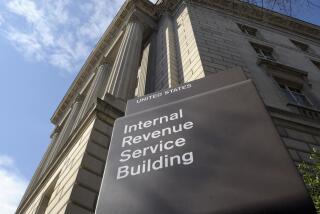Why Medicare Deduction Is on Pay Check Stub
- Share via
Q: Can you explain Medicare deduction on my paycheck? I can’t figure out what it is.--F. C.
A: Many employers are separately itemizing payroll deductions for Social Security and Medicare, rather than lumping them together as a single Social Security deduction. Why? Because beginning this year, Medicare taxes will be assessed on earnings up to $125,000 per year, nearly twice the $53,400 subject to Social Security taxes.
Here’s what’s happening: Since 1967, when the Medicare program was established, a portion of our Social Security taxes has gone to pay for it every year. This year, of the 7.65% payroll tax employees and employers each contribute to Social Security, 6.2% is strictly for Social Security while the remaining 1.45% is for Medicare. It was easier just to lump the taxes together under the general heading of Social Security when the taxes were applied evenly to earnings.
However, beginning this year, the amount of earnings subject to the 1.45% Medicare tax is nearly twice as high as those subject to the 6.2% Social Security tax. Many companies have decided to show the two taxes individually because they are levied separately.
For some workers this distinction won’t matter because they don’t earn more than the $53,400 that is subject to both taxes. But for wage earners in higher income brackets, the Medicare tax will continue long after the Social Security tax is satisfied.
There Are Ways to Give Without Reporting It
Q: In recent columns you have discussed the right of individuals to give others $10,000 annual tax-free gifts and the requirement that banks report cash transactions of $10,000 or more. I don’t get it. May my wife and I each give our daughter $10,000 from our joint bank account without reporting it to the Internal Revenue Service? And, if so, will this gift trigger a currency transaction report from our child when she deposits the amount in her bank? --A. C. D.
A: You have confused two very separate and distinct facts.
Yes, a taxpayer may give one or more individuals up to $10,000 apiece every year without reporting the gifts to the IRS.
Married couples, as two individuals, may give a total of $20,000 to as many people as they want every year without reporting it to the IRS. The gift tax law allows this.
What form these gifts take is an entirely separate issue.
In most cases, these gifts are made in the form of stock, some other tangible asset--or, if it’s a cash gift, by check. If the gift comes as a check, no report is necessary because the bank has the name and account number of the donor from the check.
However, if a $10,000 or $20,000 gift is made in cold cash, the recipient will be required to complete a currency transaction report--and then only if she tries to deposit it in the bank in one lump sum.
It’s a Good Idea to Register Bonds Again
Q: We are an elderly couple with investments in Series H and HH savings bonds. The bonds are registered in both our names. When one of us dies, will it be necessary to change the registration on the bonds to redeem them? We hope not because we fear that it would be very difficult. --N. J. L.
A: You don’t necessarily have to register your bonds when one of the co-owners dies, say officials from the Federal Reserve Bank in Los Angeles. However, bank officials highly recommend it and promise that it is quite easy.
A key reason for registering the bonds, bank officials say, is allows the surviving spouse to add a new co-owner’s name on the bonds.
Why do this? It will make redeeming the bonds a bit easier and quicker for one of your heirs who may need the proceeds before probate is settled. However, adding a joint tenant to one of your assets could expose that asset to claims from the creditors of that tenant--an undesirable side effect.
Even if you decide not to add another joint tenant on your bonds, federal authorities and legal advisers say registering the bonds in just the surviving spouse’s name could make matters easier for everyone when it’s time to redeem them.
You can reregister your bonds from home by mail. Call the Federal Reserve Bank at (800) 333-1010, Ext. 2779. Ask for Form PD4000, and complete it as required.
See Accountant Quick About Uninsured Loss
Q: My business suffered an uninsured loss in a fire in 1989. My net income that year was less than the amount of the fire loss. May I carry over the excess losses and use them as a deduction on my 1990 taxes? --R. S.
A: Please, before you do anything else, consult your accountant--and quickly. According to our tax experts, a net operating business loss, such as the one you suffered, can be carried forward for up to 15 years and used as an itemized deduction.
However, these losses may also be applied retroactively for three years if you file an amended tax return. Our experts say you should consult your accountant about filing an amended tax return for 1986, and possibly 1987 and 1988, to deduct your business losses because of the fire.
More to Read
Inside the business of entertainment
The Wide Shot brings you news, analysis and insights on everything from streaming wars to production — and what it all means for the future.
You may occasionally receive promotional content from the Los Angeles Times.










